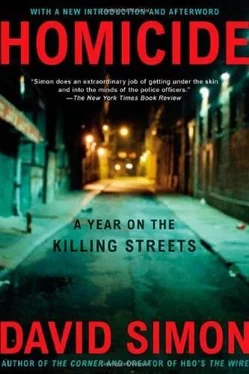Those six circuitous days and nights in Pimlico left no one with any doubt: Worden was back, having outlasted his worst year.
The Big Man’s triumphant return was also marked by his renewed and unceasing torment of Dave Brown, whose abandonment of the Carol Wright case had not exactly gone unnoticed by the older detective. For at least a part of September, Brown’s excuse was the Nina Perry investigation, which began when a couple of dopers were arrested in the car of a woman reported missing from her Stricker Street rowhouse a week earlier. Working with McLarney, Brown put that case together in fine fashion, pressuring one of the suspects to confess fully to the murder and then lead detectives to the victim’s badly decomposed remains, which he had dumped in a Carroll County backwoods.
Worden watched the Nina Perry case unfold and thought that maybe, just maybe, a detective lurked somewhere within David John Brown. The Perry case was fine work, the kind that teaches a cop something about his craft. But Worden’s generosity went no further.
“Clayvon Jones and Carol Wright,” Worden declared in late September. “Let’s see him do something with one of those.”
But Clayvon Jones would not be the true test, not after Eddie Brown came strutting into the coffee room four days ago with a letter from the Baltimore City Jail in his right hand.
“Speak to yo’ daddy,” said the older detective, dropping the letter onto the desk with a flourish. Dave Brown read about three lines before turning in prayer to the green bulkhead wall.
“Thank you, Jesus. Thank you, Jesus. Thank you, Jesus. Thank you. Thank you. Thank you.”
“Do I take care of you?” asked Eddie Brown.
“You do. You mah daddy.”
The letter had arrived in the admin office that afternoon, a hastily scrawled missive from a prisoner who had witnessed the murder of Clayvon Jones in that east side courtyard back in June. Three months later, this witness needed to barter out from beneath a drug charge. Addressed to the homicide unit, his letter included details about the crime scene that only a bona fide witness could know.
No, the Clayvon Jones killing would not be much of an education. In Worden’s considered opinion, its easy solution became simply another laurel beneath the weight of Brown’s ass. That left Carol Wright, the woman run down on the South Baltimore parking lot. For a few weeks, Brown had at least talked about picking up the Carol Wright file again and sorting through the old leads. But as far as the board was concerned, the Carol Wright case still wasn’t a murder and therefore it didn’t exist. These days, he wasn’t even mentioning the case and, as Brown’s sergeant, McLarney wasn’t making much of a stink about it either. Indeed, with Nina Perry and Clayvon Jones both safely in the black, McLarney had a new appreciation for Dave Brown’s talents.
In McLarney’s mind, the Perry case in particular counted for a lot. Brown had worked hard and a tough case involving a genuine victim had gone down. That arrest had elevated Brown to hero-of-the-week status, and he was therefore entitled to a beer or two at Kavanaugh’s with his loving and devoted sergeant. In fact, McLarney was so pleased with the Perry case that he stayed with Brown through its aftermath, sharing the remaining paperwork and evidentiary details. He only balked when it came time to pick up the victim’s maggot-infested clothing at the ME’s office.
“Fuck this, Dave. I’ll give you a hand with this tomorrow,” McLarney said after getting a quick whiff of the stench. “Let’s come back for this stuff in the morning.”
Dave Brown readily agreed and drove back to headquarters a contented man, at least until he realized McLarney wasn’t scheduled to work the next day.
“Wait a second,” he said, parking the Cavalier in the garage. “You’re off tomorrow.”
McLarney giggled.
“You little Irish potatohead.”
“Potatohead?”
“You did me, you goddamn mick.” That was the new and improved Dave Brown talking, a far cry from the detective who had penned that please-keep-me-in-homicide missive the month before. A man has to feel fairly secure before he’s willing to call his immediate supervisor an Irish potatohead, even in the casual environment of a homicide office. And of course McLarney loved it. Sitting at an admin office typewriter that same evening, he immortalized the deed in a memo to the lieutenant:
To: Lt. Gary D’Addario, Homicide unit
From: Sgt. Terry McLarney, Homicide unit
Subject: Ethnic/Slurs Comments made by Det. David John Brown
Sir:
It is with sorrow and disappointment that I call to your attention the flagrant and wanton infliction of emotional distress which was wrought upon this supervisor on this date. It is something which I have never faced in this enlightened department, and hoped that I never would. However, you should know that on this date Det. David John Brown twice made vicious verbal attacks on my ancestry, once referring to me as “a little Irish potato head” and later calling me “a little mick head.”
You, being of negligible ancestry yourself, can certainly understand my shame and chagrin. As you know, my dear mother was born and raised in Ireland and my father is the issue of fine people who were forced to flee that sainted isle during the terrible potato famine, which made the potato head remark particularly painful.
Sir, I would prefer that this matter be handled in-house by you as I would like to avoid the anguish and shame that my family would endure as a result of publicity generated by trial boards and civil action. Thus, I have decided not to make a complaint with the department’s civil rights advisory board, though I reserve the right to file with the National Labor Relations Board should in-house remedies prove insufficient. Brown used to walk foot in the Inner Harbor; he knows the area. In fact, he knows most of Edmondson Avenue, also…
Funny stuff. A little too funny, thought Worden, reading a copy of the memo. McLarney’s obvious delight in Dave Brown was helping to turn Carol Wright into nothing worse than a vague and distant memory. If the Nina Perry case meant anything at all, Worden thought, then now was the time for Brown to show it. Did he really want to work murders? Did he even know exactly what that meant? Or was he up here to submit overtime slips and close Kavanaugh’s every other night? If McLarney wasn’t going to stick a finger in Dave Brown’s eye, then the Big Man would take that responsibility upon himself. For three weeks running, in fact, Worden had been knee deep in the younger detective’s shit, waiting to see some movement on a case that Brown would like to see disappear. It’s been the full Worden treatment-cold, demanding and a little bit vicious. For Dave Brown, a man who wants nothing more than to bask in the latest success, there is no joy, no mercy, and absolutely no chance of escape.
Now, on today’s quiet eight-to-four shift, the younger detective is actually foolish enough to be caught reading the new issue of Rolling Stone in the coffee room, an act of utter indolence. Worden needs only to enter the room and ascertain that the Carol Wright file is not visible on Dave Brown’s desk.
“De-tec-tive Brown,” says Worden, imbuing each syllable with contempt.
“What?”
“Detective Brown…”
“What do you want?”
“I’ll bet you like the sound of that, don’t you?”
“The sound of what?”
“Detective Brown. Detective David John Brown.”
“Go fuck yourself, Worden.” Worden stares at the younger detective intently and for so long that Brown can no longer concentrate on the magazine.
“Quit staring at me, you old bastard.”
“I’m not staring at you.”
Читать дальше












